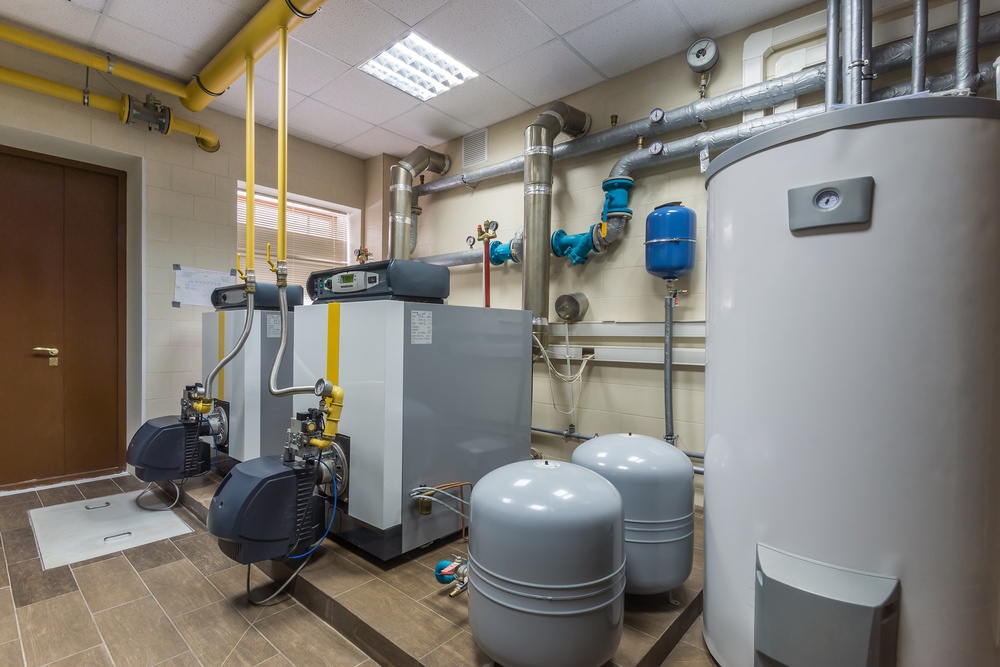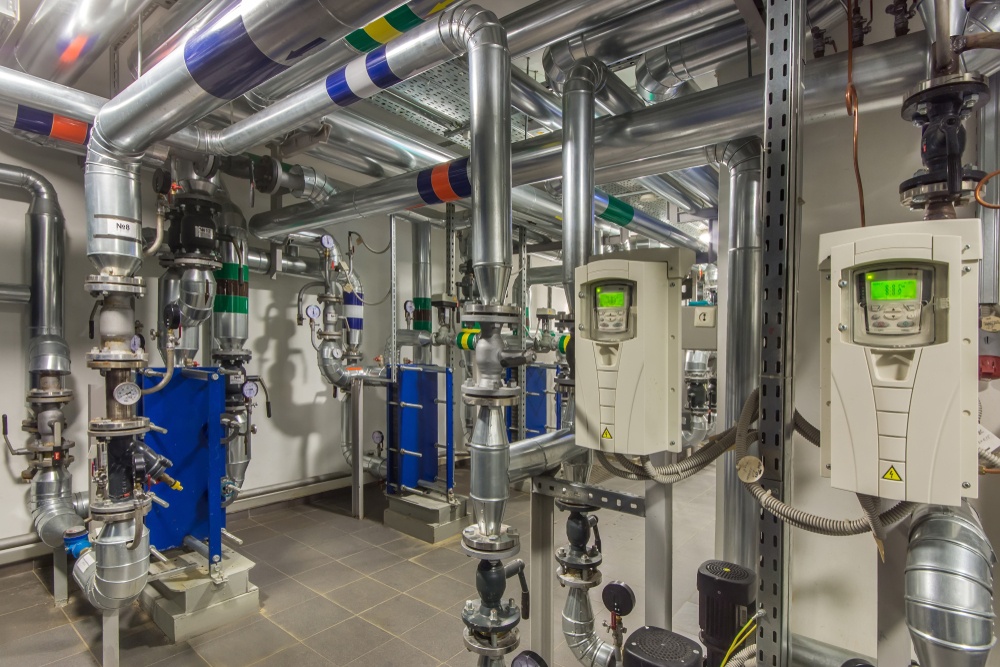Boiler Plants

Boilers are fundamental during the winter months, providing the heat output required to keep building interiors at a suitable temperature. As you might expect, boiler plants consume large amounts of fuel, and they account for a significant portion of building emissions.
With design and consulting services from professional MEP engineers, you can achieve lower heating costs while reducing the environmental impact of boiler plants. Engineering professionals also deliver designs that meet all applicable standards and building codes.
Although their name suggests otherwise, many boilers supply hot water below the boiling point, which is then used to distribute heat in building interiors with hydronic piping. Space heating systems can also be designed with steam-based heat distribution, although they are more common in older buildings. Steam is also used in some manufacturing processes and special applications like healthcare and food service.
Since a boiler involves high temperature and fossil fuel combustion, safety is a very important consideration for design engineers. The boiler plant must be designed so that building occupants are not exposed to components at high temperature, and it must be properly vented to prevent the accumulation of combustion gases.
Types of Boiler Plants
Boiler plants can be classified based on their energy input, and also the distribution system used to deliver the heating effect throughout indoor spaces. Normally, boiler plants are designed to operate with fuel combustion, since this tends to be the most economic option.
- Natural gas is the most common fuel for boilers, since it is provided as a utility service and there is no need to schedule fuel deliveries. Also, since gas distribution systems are very resilient, gas-fired boilers have a reliability advantage - they can continue operating when conditions such as harsh weather prevent the delivery of other fuels.
- Many boilers are designed for other fuels such as propane and heating oil, which are cost-effective under some circumstances. However, fuels other than natural gas require scheduled deliveries to keep the boiler plant in operation.
- For clients with access to large amounts of organic matter, biomass can also be a viable fuel input for boiler plants.
Electric boilers also exist, and they are completely independent from fossil fuels. However, these boilers have a much higher operating cost than combustion-based boilers, which limits their usefulness in buildings.
Most modern boiler plants are designed to distribute their heating effect with hot water piping. However, older systems often use steam and radiators to deliver heat. Hot water boilers are the recommended option in new constructions, unless the project includes special applications that require steam. Existing steam-based heating systems can be reconfigured to use hot water.
Importance of an Adequate Boiler Plant Capacity

“Rules of thumb” are tempting when selecting equipment because they save time, but this practice is not recommended by professional MEP engineers due to the negative consequences in the long run. An oversized boiler brings many performance and maintenance issues, and it is in your best interest to have equipment of the right capacity.
- Oversized boilers have an excessive heat output, causing them to run in short cycles. This reduces efficiency and wears down components faster.
- All boilers experience losses in the form of heat radiated from their surface. These losses increase with larger boilers.
- Boilers must purge the air inside them between cycles, which consumes additional fan power. Shorter boiler cycles lead to more frequent purging.
These factors reduce the overall efficiency of a boiler plant, increasing heating your expenses. Having an optimal boiler plant capacity reduces both your upfront investment and operating costs. In some applications, many boilers of smaller capacity are preferred over a single unit, providing flexibility to meet a wide variety of heating loads.
Improving the Efficiency of Boiler Plants
Like many other mechanical systems, boiler plants operate more efficiently when they are serviced properly. One of the best recommendations is getting a boiler tune-up at regular intervals, which brings several benefits:
- Boilers operate more efficiently when they have an adequate airflow. Insufficient air reduces the heating efficiency of a boiler, but excessive airflow increases heat loss from the unit.
- Burners and other boiler components accumulate dust and particles over time, which gradually reduces their efficiency. To keep efficiency high, boiler components must be cleaned at regular intervals.
There are also many system upgrades that can improve the efficiency of a boiler plant permanently.
- Upgrading from manual to automatic thermostat controls is a simple and cost-effective energy efficiency measure.
- Hot water pumps and air handlers can be equipped with variable-frequency drives for speed control under partial load, which is more efficient than intermittent operation.
- Significant efficiency gains are also possible with automatic boiler blowdown controls, which adjust the air supplied to the boiler in real time to achieve optimal operation.
- Boilers can also improve their efficiency with an economizer, which recovers heat from exhaust gases to pre-heat the water being delivered to the boiler. This lowers the total heat that must be supplied by the boiler, reducing its operating cost.
Safety Considerations When Designing Boiler Plants
While most space cooling systems operate only with electricity, boiler plants also rely on fuel combustion. This brings an additional requirement: designing an exhaust system that removes flue gases effectively, preventing their accumulation in building interiors.
Combustion produces various substances that are harmful for humans, but carbon monoxide requires special attention - it is odorless and colorless, but extremely toxic for humans. This gas should not be confused with carbon dioxide, which is rarely a threat in building interiors because, requiring a much higher concentration to become hazardous.
Scheduling Boiler Maintenance and Upgrades Effectively
Since boiler plants are fundamental during the colder months of the year, maintenance and equipment upgrades can only be performed effectively during summer, when buildings do not rely on boilers to keep a suitable indoor temperature.
Periodic inspections by qualified MEP engineers are recommended to detect potential issues affecting your boiler plant and its associated components. These issues can then be solved proactively, avoiding emergency reparations. When maintenance activities are scheduled with anticipation, reliable space heating is guaranteed once the cold weather arrives.





